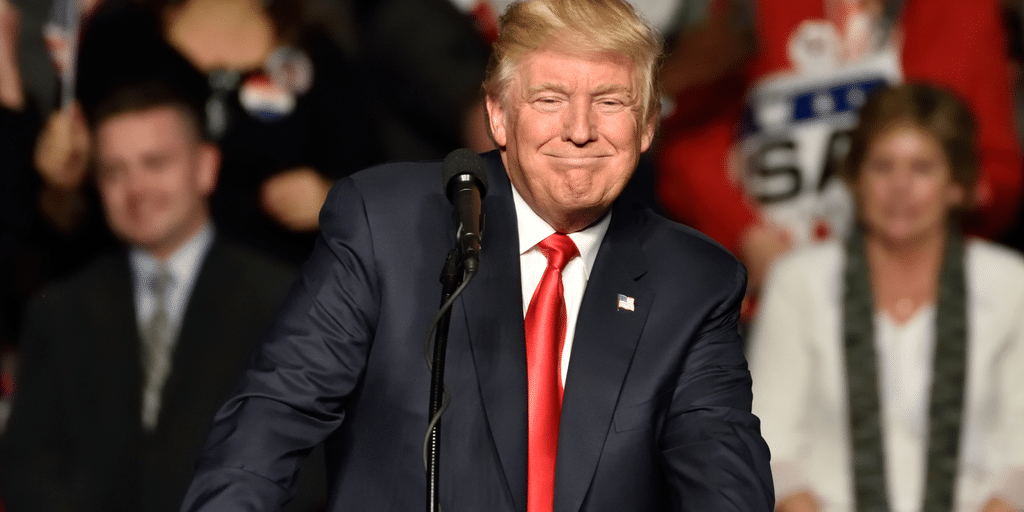Exploring the Intersections of Politics and the crypto Industry: Trump’s Vision
In recent times, the conversation between politics and the burgeoning crypto industry has intensified. Notably, the dialogue has taken a significant turn with the entry of former President Donald Trump into the crypto discussion, particularly as he integrates substantial plans for cryptocurrency into his campaign narrative. His approach suggests an attempt to bridge political engagement with the interests of digital asset enthusiasts, an effort that appears to be shaping the future relationship between governance and the crypto space.
The Nexus of Innovation and Economy
The recognition of cryptocurrency alongside artificial intelligence as pivotal arenas for innovation underscores a forward-thinking stance toward technological advancement. The draft document released in July indicates a strong inclination toward leveraging these areas to foster what could become the “greatest economy in history.” This perspective seems to align with the larger vision of transforming the economic landscape through technological innovation, emphasizing the critical role of crypto in achieving such advancements.
Challenging the Current crypto Narrative
Despite the apparent absence of crypto from the 20 core goals of the Republican Party’s official 2024 platform, the emphasis on ending what is described as an ‘unlawful and un-American crypto crackdown’ portrays a decisive take against current regulatory pressures. Furthermore, the commitment to oppose the creation of a Central Bank Digital Currency (CBDC) and to defend the rights to mine bitcoin and ensure self-custody of digital assets reflect a libertarian approach to cryptocurrency, seeking to minimize government interference and surveillance.
Regulatory Adjustments and Proposals
The proposition for friendlier regulation, highlighted by the passage of a legal framework by the Republican-led U.S. House, marks a crucial step toward providing a more conducive environment for the crypto industry. Trump’s promise to establish a presidential advisory committee to craft regulatory guidance further demonstrates an intention to align government policies with the interests of the crypto community, aiming for regulations that support rather than stifle industry growth.
A Strategic Vision for bitcoin
Among the intriguing aspects of the envisioned crypto policy are plans to build a bitcoin stockpile and dominate bitcoin mining. The idea to transform the U.S. into a bitcoin superpower through a strategic reserve and ensuring that mining operations are situated within the country reflects an ambition to position the U.S. at the forefront of the global crypto industry. Such measures not only aim to bolster the country’s strategic assets but also to counteract potential dominance by other nations in this sector.
Upholding the Principle of Self-Custody
The emphasis on the right to self-custody aligns with a fundamental principle cherished by many within the crypto community. This stance, opposing the restrictions on self-hosted wallets proposed by certain legislation, champions the autonomy of individuals in managing their digital assets. It resonates with the broader ethos of the cryptocurrency movement, which valorizes decentralized control and privacy.
Caution Against CBDC
The skepticism toward Central Bank Digital Currencies (CBDCs) reflects concerns over privacy and government overreach. The stance of protecting Americans from the perceived threats posed by CBDCs speaks to a broader apprehension about digital currencies that could potentially enable unprecedented levels of surveillance and control by governments over individuals’ financial transactions.
Conclusion
As the political landscape continues to evolve, the interplay between policy-making and the crypto industry becomes increasingly complex. The positions articulated by figures such as Trump highlight a growing recognition of cryptocurrency’s potential to shape economic futures. Moreover, these discussions bring to the forefront critical questions about regulation, privacy, and the role of government in the digital age. As we move forward, the dialogue between the political realm and the crypto space promises to be both challenging and transformative, potentially setting the stage for a new era of economic innovation and freedom.
Reflecting on these developments, it becomes clear that the intersection of politics and cryptocurrency will be a key battleground for ideas and policies that will shape the future digital economy. The discourse around these issues underscores the need for thoughtful engagement and debate to navigate the complexities of this rapidly evolving landscape.
